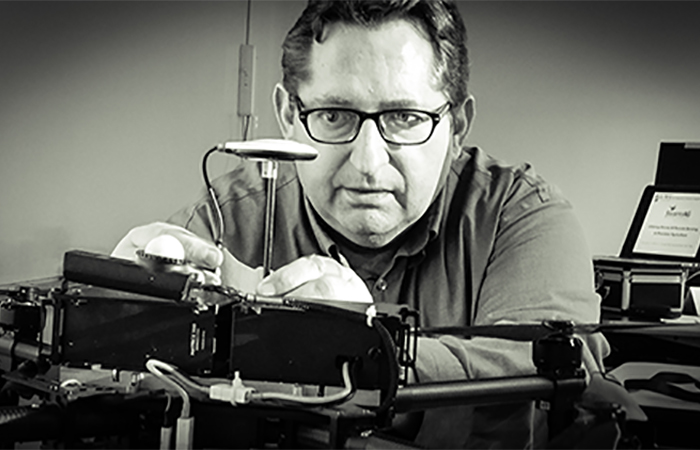Read more about this fascinating co-founder who built a company that brings together drone technology, proprietary software and data analysis to mitigate disease and improve farming operations.
If you spend just a few minutes speaking to Doug about drone technology, you’ll quickly become an evangelist because his enthusiasm is infectious! Doug’s grandfather was a farmer from Missouri, so he’s no stranger to the struggles of farm life. As a commercial drone pilot with a deep background in information technology he quickly realized the opportunity for drone use in agriculture. He and co-founder, Alan Perry, an agricultural scientist, launched SwarmAG in 2017. Alan brings extensive domestic and international agronomist knowledge and experience to the business. Also, Alan is a fifth-generation farmer in Maine and has the first-hand experience as well as the personal connections to the local farmers. Together, Doug and Alan have grown SwarmAG into a full-fledged precision agriculture & data services company.
First, what drew you to settle in Maine?
I moved to Maine from California in 2011. At the time I was looking for a change and I had a friend in the Bangor area who invited me to come out and he helped me to get started. That led me to shopping cart design work I did for LLBean as an information architect and later to the work I do now for SwarmAG.
After your career in bilingual web design, how did you get involved with drones and precision agriculture?
My grandfather was a farmer from Missouri, so I’m no stranger to the struggles of farm life. And especially nowadays it’s almost impossible to remain profitable in farming. So when I became interested in drones, I immediately began to imagine how useful they could be to farmers in Maine. Coming from IT, it was a logical leap from pushing pixels to piloting drones. After I got my FAA commercial drone license I began doing research with local farmers and I wanted to help Maine’s struggling agricultural economy. SwarmAG’s goal is to put knowledge and power into the hands of Maine farmers so they can make more informed agricultural decisions. In 2017, recognizing the demand for sUAS technologies in Northern Maine, I formed a partnership with an agricultural scientist to begin SwarmAG, as a drone and data services provider in precision agriculture. Since then we’ve grown into a full-fledged precision agriculture & data services company.
How does one get qualified as a drone pilot and what are the opportunities in that field?
In order to fly drones commercially, the bare minimum requirement is to have an FAA commercial UAS license. There are plenty of online and in-person ground schools available to help you study; also it is possible to do it on your own. In my case, I graduated from a ground school program and received a certificate in the process. I think doing it that way was far more rewarding and helped me to achieve an almost perfect score on the FAA exam. As for opportunities in the industry, Goldman Sachs made the following prediction: “Between now and 2020, we forecast a $100 billion market opportunity for drones—helped by growing demand from the commercial and civil government sectors”. The Association for Unmanned Vehicle Systems International, the trade group that represents producers and users of drones and other robotic equipment, predicts that 80% of the commercial market for drones will eventually be for agricultural uses. According to TechRepublic.com, “The global market revenue for drones, or unmanned aerial vehicles (UAVs), is expected to reach $6 billion by the end of 2017 and top $11.2 billion by 2020.” At SwarmAG we intend for Maine agriculture to be on the cutting edge of this exciting and helpful technology.
What do you see as the challenges and opportunities in working with the agricultural industry?
The opportunity is tremendous, both on a personal and professional level. We get to help farmers in a very significant way – and they really need help. It’s becoming more and more difficult to make it farming these days because of a number of economic stress pressures and razor-thin margins. The cost of farm materials has gone up while the price of commodities has gone down. Unlike the average worker, who is guaranteed a minimum wage for every hour he works, farmers begin each season with complete uncertainty. There is no guarantee, and even if and when there’s a solid yield at harvest time, the farmer will likely struggle. And if the farmer is asked to store the crop until next season (which happens regularly with potato crops), payment for that crop will not be tendered until the pickup date by the farmer’s client. So any sort of cost savings and efficiency increase we can provide can make a huge difference to his bottom line. On a personal level, there’s nothing more satisfying than being able to help someone directly, today. We offer both immediate and long-term benefits from the type of work we do and knowing I’m personally helping to feed our community and the rest of the world just makes me smile. I honestly feel like what I’m doing is more than a job; it’s a calling.
Any advice for people wanting to start a business in Maine?
Maine is a wonderful place to be on planet earth. The people are friendly and it often feels like the “biggest little place” I’ve ever been because I continue to discover new hidden gems, either in nature or from Maine’s unique New England culture. So if you are new, first take some time to get your feet wet. Then when you are ready to jump in, don’t worry about how you land. Just jump into the deep end and do your best to make a swan dive along the way. I mean, you are going to make a ton of mistakes. Be willing to accept that and make those mistakes. And if you can laugh about it along the way, get others to share the experience and laugh together about your less than perfect attempt at a swan dive. As for building a viable company, keep an eye out in your industry for opportunities that make your company unique and add true value for your customers. Doing business comes down to two things: 1) Execution. 2) A compelling product or service. If you can manage to at the very least not screw up your opportunity and be very mindful of your day-to-day operations you may stand a chance. And if you can answer a true need or requirement of your target customer base, your new customers will feel like they are at a disadvantage for not using your product or service. Finally, be good to people; it’s just the right thing to do.


